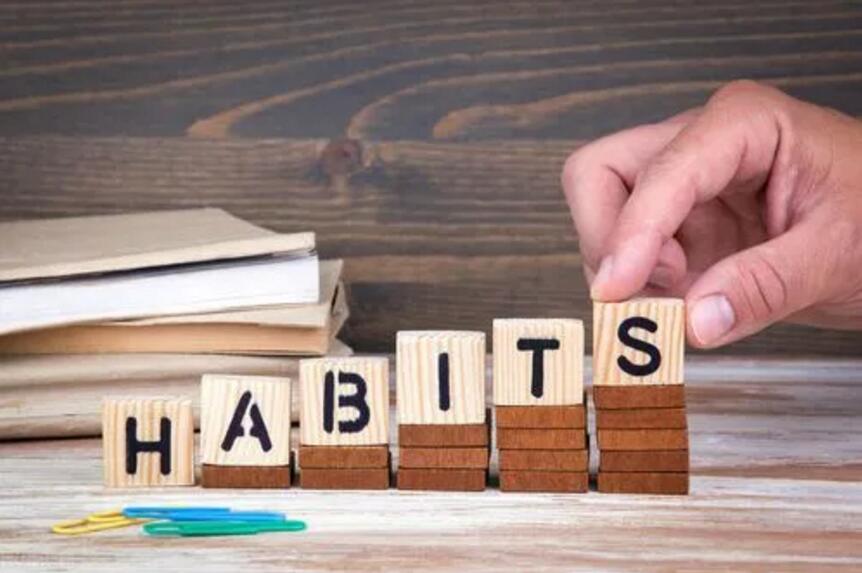如何养成习惯二)
正文翻译

How do you build a habit?
如何养成习惯?

How do you build a habit?
如何养成习惯?
评论翻译
Human Psychology Facts
In the Book Atomic Habits, the author mentions the human psychology behind the development of a new habit, and why people find it difficult to continue on that new habit.
I will try to summarize it here in simple terms.
Let’s first start by discussing why is it so easy to develop a bad habit.
There are primarily two reasons why developing a bad habit is easy:
They provide immediate satisfaction.
Any “bad” habit has the distinction of providing immediate satisfaction. Be it scrolling social media or smoking, all these habits are quick on stimulating a ‘high’ among users. This ‘high’ triggers their brain’s pleasure points, which forces you to do more of this activity.
They are easy to do.
在《原子习惯》一书中,作者提到了一种新习惯形成背后的人类心理,以及为什么人们发现很难继续保持这种新习惯。
我在这里将尝试用简单的术语来总结它。
让我们首先讨论一下为什么养成坏习惯如此容易。
养成坏习惯之所以容易,主要有两个原因:
它们能让人立即感到满意。
任何“坏”习惯立即提供满足的特点。无论是浏览社交媒体还是吸烟,所有这些习惯都能迅速在用户中激发“快感”。这种“快感”会触发大脑的快感点,迫使你不断促进此习惯。
它们很容易做到。
The effort required to do these activities is very less. You just have to take your phone out, unlock it, and start the social media app. Compared to this, imagine developing a good habit like going to the gym. Even the thought of such an effort makes you jittery.
The absence of these two points with respect to new habits is why it is difficult to develop them.
Now how to develop good habits or cultivate new habits?
The book mentions a 4-pronged approach to develop new habits, considering human psychology in play:
Make it Obvious
To make a new habit obvious, first write down your current habits, and become more aware of them. Sometimes we do things unconsciously, hence we can miss out on the negative habits of ours.
做这些活动所需的努力非常少。你只需拿出手机,解锁,然后启动社交媒体应用程序。相比之下,想象一下养成一个好习惯,比如去健身房。甚至一想到这样的努力都会让你紧张不安。
在新习惯方面缺乏这两点,这就是为什么很难培养新习惯的原因。
现在如何养成好习惯或培养新习惯?
这本书提到了一种培养新习惯的四管齐下的方法,考虑到人类心理的作用:
让它变得明显
为了使一个新习惯变得明显,首先写下你当前的习惯,并更加注意它们。有时我们会无意识地做一些事情,因此我们会错过一些消极的习惯。
After this step, write down when and where you will perform the new habit. This write-down should be consistently visible to you until you do this activity.
Try to do this new habit along with a habit you currently have, or with something you love to do. When you will associate this new habit with a loving activity, chances are you will do it more.
Lastly, design your environment in such a way that it conduces you to perform that new habit.
Make it Attractive
You can use the method I mentioned earlier where you can perform the new habit after a habit which you love doing. Otherwise, pair it with something you need to do. That will make it attractive.
Make it Easy
Divide the activity into small steps. Without much thinking, perform the first step. This first step should be such that it should not take you more than two minutes to complete it. Once you get the taste of it, you would want it more.
在这一步之后,写下你将在何时何地养成新习惯。在你培养此习惯之前,你应该始终可以看到此记录。
试着把这个新习惯和你现在有的习惯或者你喜欢做的事情一起做。当你将这个新习惯与一项钟情的活动联系起来时,你很可能会做得更多。
最后,设计你的环境,使其有助于你养成新习惯。
让它更有吸引力
你可以使用我之前提到的方法,你可以在一个你喜欢的习惯之后再养成一个新习惯。否则,将它与你需要做的事情配合进行,这将使它具有吸引力。
让它变得简单
将习惯分为几个小步骤。不用太多思考,执行第一步。第一步的完成时间不应超过两分钟。一旦你试过,你会更想要它。
Also, try automating stuff as much as you can - use technology to aid you in developing this new habit.
Make it satisfying
The problem with sustaining a new habit is that it doesn’t reward you immediately - this is why people on a diet give up dieting, because they don’t see losing weight soon. This is why you should try to reward yourself in a way that keeps you motivated enough to continue performing the new habit.
You can also use a habit tracker - which tracks your new habit and informs you of the progress you have made. Once you see your progress in numbers, it immediately motivates you to continue.
You can also ask your relatives to help you in this regard.
One should definitely read this book to know more about how to develop new and good habits. It has helped me a lot. I have been working on myself for quite some time now, and the book has helped me form the right habits for the same.
此外,尽可能多地尝试自动化—使用技术来帮助你养成这个新习惯。
让它令人满意
维持一个新习惯的问题是它不会立即给你带来回报——这就是为什么节食的人会放弃节食,因为他们不会很快看到减肥的效果。这就是为什么你应该尝试用一种让你有足够动力继续执行新习惯的方式来奖励自己。
你也可以使用习惯追踪器——它会追踪你的新习惯,并告诉你你所取得的进步。一旦你看到相关进步,它会立即激励你继续执行下去。
在这方面,你也可以请你的亲戚帮你。
人们绝对应该读这本书来了解更多关于如何养成新的好习惯的知识,它帮了我很多。我已经为自己努力了很长一段时间了,这本书同样帮助我养成了好习惯。
Micha Stawicki
There are two routes I recognize by which you can build a lasting habit. One is a habit loop described in Charles Duhigg's book "The Power of Habit". I found it mentioned in a few other books, blog posts and literature.
The other one is much less known. Aside from my own ruminations I found it only on James Clear’s blog. This path involves identity habits.
I also know of a couple of rarely-mentioned enhancements that work nicely with both methods.
I. The habit loop.
This is the core of Dughill's message which is based on a vast amount of brain research done over the last few decades.
A habit consists of the cue, routine and reward. Those three elements are stored in your brain as one unit. You get the signal to perform your habit, you perform it and then comes the reward that finishes the loop.
我知道有两条途径可以让你养成持久的习惯。一个是查尔斯·杜希格(Charles Duhigg)的《习惯的力量》一书中描述的习惯循环。我发现在其他几本书、博客文章和文学作品中也提到了它。
另一个则鲜为人知。除了我自己的沉思之外,我只在詹姆斯·克莱尔(James Clear)的博客上找到了它,这条道路涉及身份习惯。
我还知道一些很少提到的增强习惯的手段,它们可以很好地配合这两种方法。
一、 习惯循环。
这是杜希格书中信息的核心,该信息是基于过去几十年对大脑的大量研究所得。
习惯包括提示、常规和奖励。这三种元素作为一个单元存储在你的大脑中。你得到了执行你习惯的信号,你养成了习惯,然后得到了完成习惯循环的奖励。
This approach is the foundation of a number of coaching programs and habit development models (mini habits, tiny habits and more). It's a great way to build small habits and, better yet, to build physical habits, like exercising, drinking water, eating the right kind of food, etc. Those activities are ingrained into your body, so this mind to body connection (a loop in your brain) facilitates the process of habit development.
I don't necessarily agree with the last piece of this model being referred to as a "reward". I think researchers misnamed it because they were biased by the experiments they performed.
In their brain research, they were experimenting on laboratory rats. They trained them to find a way to a piece of chocolate in the labyrinth. After some time, the animals were habitually finding the way to the treat. The taste of chocolate was closing the loop and completing the habit in their brain. If they didn't find the chocolate, they were confused because the loop in their brains was still active.
Well, we are not rats, life is not a labyrinth and chocolate is evil (surely for me, with my sweet tooth).
However, my experience suggests that you don't need a reward at the end of the loop, you just need a clear endpoint.
这种方法是许多指导计划和习惯发展模型(小习惯、微习惯等)的基础。这是养成小习惯的好方法,更好的是,养成身体习惯,如锻炼、喝水、吃正确的食物等。这些活动根深蒂固地存在于你的身体中,因此这种身心联系(大脑中的一个循环)促进了习惯的发展过程。
我不一定同意这个模型中被称为“奖励”的最后一部分。我想研究人员取错了名字是因为他们被自己所做的实验所误导。
在他们的大脑研究中,他们用实验室老鼠做实验。他们训练它们在迷宫中找到一块巧克力的方法。过了一段时间,动物们习惯性地找到了通往食物的路。巧克力的味道在他们的大脑中关闭了这个循环,完成了这个习惯。如果他们没有找到巧克力,他们会感到困惑,因为他们的大脑回路仍然活跃。
好吧,我们不是老鼠,生活不是迷宫,巧克力是邪恶的(当然这是对我来说,因为我喜欢吃甜食)。
然而,我的经验表明,在循环结束时,你不需要奖励,你只需要一个明确的终点。
Endpoint
The habit loop approach is also great for developing a habit when your life (or just part of your day) is highly structured. For example, I developed several habits which are cued by my commute to and from work.
While I wait for a suburban train, I meditate for a few minutes. The cue for my meditation habit is arriving on the train platform, the routine is my meditation and the "reward" (you see how inappropriate the name is in this context? Let's call it an endpoint from now on) is arrival of the train.
When I transfer between suburban and subway trains, I repeat my personal mission statement in my head. Cue: stepping off the suburban train. Routine: repeating my personal mission statement. Endpoint: arriving on a subway train platform.
The way to the office by subway takes me almost exactly ten minutes. On the way to work I read a book written by a saint. On a way back home I practice speed reading. The cues are finding a place in a subway train. The endpoints are arrivals to the destinations.
I haven't mentioned even half the habits coupled with my daily commute. Every time your schedule is highly structured, you have a great opportunity to build your habits via the habit loop method.
I have also a whole stack of habits I do right after waking up and when preparing for sleep in the evening. Waking up and going to sleep are other habits ingrained in your life for good and you can build upon them.
终点
当你的生活(或仅仅是一天中的一部分)是高度结构化的时候,习惯循环法也有助于养成习惯。例如,我养成了几个习惯,这些习惯是由我上下班的通勤时间决定的。
当我在郊区等火车时,我沉思了几分钟。我的冥想习惯的暗示是到达站台,例行公事是我的冥想和“奖励(你知道这个名字在这里有多不合适吗?从现在起我们称它为终点)是火车到站。
当我在郊区和地铁之间换乘时,我会在脑海中重复我个人的使命宣言。暗示:从郊区火车上下来。例行公事:重复我的个人使命宣言。终点:到达地铁站台。
坐地铁去办公室的路几乎正好需要十分钟。在上班的路上,我读了一本圣人写的书。在回家的路上,我练习速读。暗示是在地铁中找到一个位置。终点是到达目的地的终点。
我甚至还没有提到我每天通勤的一半习惯。每次你的时间表高度结构化时,你都有机会通过习惯循环方法来建立习惯。
我还有一大堆起床后和晚上准备睡觉时的习惯。醒来和睡觉是你生活中根深蒂固的其他习惯,你可以在这些习惯的基础上继续发展。
Developing a habit
The actual habit development is amazingly simplistic. You design your behavior using cue-routine-endpoint system and then perform according to your design. Anchoring your cue to an existing habit can be very efficient.
Several examples from Tiny Habits course:
"After I brush, I will floss one tooth."
"After I pour my morning coffee, I will text my mom.”
"After I start the dishwasher, I will read one sentence from a book.”
“After I walk in my door from work, I will get out my workout clothes.”
“After I sit down on the train, I will open my sketch notebook.”
"After I hear any phone ring, I will exhale and relax for 2 seconds.”
“After I put my head on the pillow, I will think of one good thing from my day.”
“After I arrive home, I will hang my keys up by the door.”
养成习惯
实际的习惯发展是惊人的简单化。你使用暗示例程终点系统设计你的行为,然后根据你的设计执行。将你的暗示与现有习惯上联系起来可能非常有效。
以下是《小习惯》课程的几个例子:
“刷牙后,我会用牙线清洁牙。”
“我倒了早上的咖啡后,会给妈妈发短信。”
“启动洗碗机后,我会读书中的某句话。”
“下班进门后,我会换上运动服。”
“在火车上坐下后,我会打开我的素描笔记本。”
“当我听到电话铃响后,我会先呼气放松2秒钟。”
“当我把头枕在枕头上后,我会想起我当天中的某件好事。”
“到家后,我会把钥匙挂在门口。”
II. Identity habits.
In case of these habits, you don't need to be so meticulous about the tiny details; you perform them because you are a person who does such things, no matter what. For example, I am a writer. I have a habit of writing 1,000 words a day. Nevertheless, scientists from MIT could study me for months and wouldn’t uncover any consistent circumstances or existing loop that trigger my writing activity.
I write in every possible circumstance—at home, at work, on trains, waiting for trains, on the bench at a park...
I usually write in English, but sometimes in Polish.
You might find me writing at any hour—early in the morning before work, during my commute to/ from work, during the day (yes, at the office), or late in the evening when everybody sleeps. I generally write on my laptop, but sometimes I write by hand, and I write for several different audiences. I write short eBooks, blog posts, Quora answers, articles to magazines, philosophical ruminations, and I’m also writing a novel.
I write because I identify myself as a writer, not because circumstance and routine triggers an electrical impulse in the reptilian part of my brain.
身份习惯。
对于这些习惯,你对微小的细节不需要如此细致;你这样做是因为你是一个无论如何都会这样做的人。例如,我是一名作家。我有每天写1000字的习惯。尽管如此,麻省理工学院的科学家可以研究我几个月,(即使这样)也不会发现存在任何一致的情况或现有的循环,触发我的写作活动。
我在任何可能的环境中写作:在家里,在工作中,在火车上,在等待火车的时候,在公园的长椅上……
我通常用英语写作,但有时用波兰语。
你可能会发现我在早上上班前、上下班途中、白天(是的,在办公室)或每个人都已睡觉的深夜等任何时候写作。我通常在笔记本电脑上写字,但有时我手写,为不同的读者而写作。我写短篇电子书,博客帖子,Quora答案,杂志文章,哲学沉思,同时也在写小说。
我写作是因为我认同自己是一个作家,而不是因为环境和惯例触发我大脑爬行动物那部分电脉冲。
A scientific gaping hole
I'm not that kind of guy who researches for and reads scientific papers as a hobby. I found, however, that if you are interested in a subject, you will stumble on some research regarding it sooner or later, especially in popular publications, printed or online (like Huffington Post where they translate eggheads' talk into plain actionable English. ;)
But I've never found anything about identity habits, which I believe is a huge omission.
It's nice to build a habit of drinking a glass of water first thing in the morning, but do you really need a habit loop for that? I think a habit like doing 30+ consecutive pullups or writing 1,000 words a day is more interesting for most of us and such habits are much more easily developed via the identity habits route.
How does one develop a new identity?
It starts in your head. Who do you think you are? A son, daughter, mother or father? Do you identify with your occupation or nationality? Whatever your answers are, try to think about why you identify with those labels.
Why do you consider yourself this or that? What conditions do you need to meet to keep that identity?
科学上的漏洞
我不是那种喜欢研究和阅读科学论文的人。然而,我发现,如果你对一个主题感兴趣,你迟早会偶然发现一些相关的研究,特别是在流行出版物,印刷品或线上内容(如《赫芬顿邮报(Huffington Post )》,他们把理论家的谈话翻译成简单可行的英语。
但我从来没有发现任何关于身份习惯的东西,我认为这是一个巨大的遗漏。
养成早上第一件事就是喝一杯水的习惯很好,但你真的需要为此建立一个习惯循环吗?我认为,对我们大多数人来说,像连续做30多个 引体向上或每天写1000个单词这样的习惯更有趣,而且通过身份习惯途径更容易养成这种习惯。
一个人如何发展新的身份?
它从你的脑袋开始。你以为你是谁?儿子、女儿、母亲还是父亲?你认同你的职业或国籍吗?无论你的答案是什么,试着想想你为什么认同这些标签。
你为什么认为自己是这个或那个?你需要满足什么条件才能保持这种身份?
I am a writer.
I needed just a single thought to sneak into my conscious mind to start identifying with this name. When that happened it wasn't even a dream, it was a wish. I had no experience nor skills. Until that moment in time, I had written only school assignments (including my Masters' thesis), one short story as a teenager and a lot of stuff on online forums, none of which had a literary focus. Today I have more than a million words under my belt.
Once the thought of becoming a writer had entered my head I couldn't get rid of it. I started researching what "being a writer" means. I found the definition that spoke to me: writers write. So I started to write.
Doing is the ultimate test of your new identity.
Decide on something, then start to execute upon it. If you can persist and can do that without overusing your willpower, you've found the right identity.
If you fail, seriously reconsider your position. Maybe you've just followed someone else's dream?
Identity equals drive. If you are a son or a mother, you simply cannot imagine your life without this identity. That's why the identity approach is so useful in developing habits. You will do whatever is necessary to keep your identity. You will do it every day.
我是一名作家。
我只需要一个念头潜入我的意识,就能开始认同这个名字。当这一切发生时,它甚至不是一个梦,而是一个愿望。我既没有经验也没有技能。在那之前,我只写过学校作业(包括我的硕士论文),十几岁时写过一篇短篇小说,在网上论坛上写过很多东西,可是没有一篇是关于文学的,今天我已写超过一百万个字数。
一旦成为作家的念头进入我的脑海,我就无法摆脱它。我开始研究“成为作家”意味着什么。我找到了对我有启发的定义:作家写作。于是我开始写作。
行动是对你新身份的终极考验。
决定某事,然后开始执行。如果你能坚持,并且不过度使用意志力,你就找到了正确的身份。
如果你失败了,请认真重新考虑你的身份。也许你只是追随了别人的梦想?
身份等于驱动力。如果你是儿子或母亲,你根本无法想象没有这种身份的生活状态。这就是为什么认同身份的方法在培养习惯方面如此有用。你会做任何必要的事情来保持你的身份,而且每天都会这样做。
III. Habits tools.
There are a lot of hacks and tricks involved in developing habits, but most are dependent upon your personality. Some of us are motivated by feedback from peers, whereas you might hate it if you feel forced to do something. Some need to know the why and how behind each step, you might take everything at face value and just try to do your best. For tips and tricks, I recommend the most comprehensive book on habits "Better than Before" by Gretchen Rubin.
I also found two more not-very-well-known "tools" which I think are good for both loop and identity habits. These tools are the secret weapons that can help you develop any habit.
It's possible that there may be cases in which they are not helpful, . However, I have built a few dozen habits, from drinking a glass of water to keeping three gratitude diaries, and these tools helped me with every single of them.
习惯工具。
养成习惯有很多技巧,但大多数都取决于你的个性。我们中的一些人受到同龄人反馈的激励,而如果你觉得被迫做某事,你可能会讨厌它。有些人需要知道每一步背后的原因和方式,你可能只看表面,尽力做到最好。关于建议和技巧,我推荐格雷琴·鲁宾关于习惯的最全面的书《比以前更好》。
我还发现了另外两个不太知名的“工具”,我认为它们对习惯循环和身份习惯都有好处。这些工具是可以帮助你养成任何习惯的秘密武器。
在某些情况下,它们可能没有帮助。然而,我已经养成了几十个习惯,从喝一杯水到写三篇感恩日记,这些工具都帮了我。
1. Tracking.
I don't agree with those who claim that tracking is limiting and cripples your chances to develop new habit. They argument that tracking constricts a person, making them feel like a prisoner or a laboratory rat under scrutiny.
In my experience tracking is pure gold in habit creation and is a factor that can make or break your habit. Without tracking, the chances for habit development reduce drastically.
If you keep everything in your head, your subconscious can trick you into believing you are achieving your goals, or even that you don't need the habit you are trying to form. It can twist everything and sell you a bunch of distortions mixed with a little truth to make them believable.
So, what is habit tracking?
In its simplest form, you are just recording whether you have done your habit or not. The means you use to record this is absolutely up to you. You may use pen and paper, an Excel sheet, a text file, an application, a wall calendar- anything.
Tracking in the form of a journal is widely known and recommended by many researchers and coaches. Journals are used in many areas: a writing log, food journal, exercise log and so on. They are recommended, because they work.
跟踪
我不同意那些声称追踪会限制和削弱你养成新习惯的人。他们辩称,追踪会让人感到压抑,让他们感觉自己像是一个囚犯或是一只被仔细检查的实验室老鼠。
根据我的经验,追踪是养成习惯的完美方法,是一个可以养成或打破习惯的因素。如果不进行追踪,养成习惯的机会就会大大减少。
如果你把一切都记在脑子里,你的潜意识会欺骗你,让你相信你正在实现目标,甚至你不需要这些试图养成的习惯。它可以扭曲一切,向你兜售一堆扭曲的东西,再加上一点真相,让它们变得可信。
那么,什么是习惯跟踪呢?
在最简单的形式中,你只是记录你是否养成了习惯。你用来记录这一切的方法完全取决于你自己。你可以使用纸笔、Excel表格、文本文件、应用程序、挂历等任何东西。
许多研究人员和教练都广泛知道并推荐以日志形式进行追踪。日记被用于许多领域:写作日志、饮食日志、锻炼日志等等。之所以推荐它们,因为它们有效。
It works like magic
In 2012 I lost about 15 pounds. It took me several months and I used various methods, from ditching sweets, intermittent fasting and introducing more vegetables into my diet, to intensifying my exercise program. But my progress stalled in December. At the beginning of January 2013, I started a food journal. I registered everything I consumed, every gulp of soda and crumb of bread. I didn't change my exercise program. I didn't change my diet. I just noted down my consumption.
My awareness with regard to the amount and quality of food I ate increased almost magically. And I lost those last six stubborn pounds.
My story is not some aberration. Journaling, and tracking in general, works because it immensely increases your awareness. It instills filters in your brain. We get about 100 million sensual impulses every second -- this is gigabytes of data. Your conscious mind perceives only a small fraction of that info ocean. Tracking creates additional filters that redirect a portion of this vast amount of data to your conscious mind. Your attention determines what you become conscious about.
它就像魔术一样
2012年,我瘦了大约15磅。我花了几个月的时间,我用了各种方法,从戒掉甜食、断断续续地禁食、在饮食中加入更多的蔬菜,到强化锻炼计划。但我的进步在12月份停滞不前。2013年1月初,我创办了一本食品杂志。我记录了我吃的所有东西,包括每一口苏打水和面包屑。我没有改变我的锻炼计划。我没有改变我的饮食。我只是记下了我的消耗量。
我对所吃食物的数量和质量的认识程度几乎神奇地提高了。我最后减掉了六磅。
我的故事不是什么反常现象。一般来说,写日记和跟踪都是有效的,因为它极大地提高了你的意识。它会在你的大脑中注入过滤器。我们每秒收到大约一亿个感官冲动——这是千兆字节的数据。你的意识只感知到信息海洋的一小部分。跟踪创建了额外的过滤器,将大量数据的一部分重新定向到你的意识思维中。你的注意力决定了你的意识。
In the Book Atomic Habits, the author mentions the human psychology behind the development of a new habit, and why people find it difficult to continue on that new habit.
I will try to summarize it here in simple terms.
Let’s first start by discussing why is it so easy to develop a bad habit.
There are primarily two reasons why developing a bad habit is easy:
They provide immediate satisfaction.
Any “bad” habit has the distinction of providing immediate satisfaction. Be it scrolling social media or smoking, all these habits are quick on stimulating a ‘high’ among users. This ‘high’ triggers their brain’s pleasure points, which forces you to do more of this activity.
They are easy to do.
在《原子习惯》一书中,作者提到了一种新习惯形成背后的人类心理,以及为什么人们发现很难继续保持这种新习惯。
我在这里将尝试用简单的术语来总结它。
让我们首先讨论一下为什么养成坏习惯如此容易。
养成坏习惯之所以容易,主要有两个原因:
它们能让人立即感到满意。
任何“坏”习惯立即提供满足的特点。无论是浏览社交媒体还是吸烟,所有这些习惯都能迅速在用户中激发“快感”。这种“快感”会触发大脑的快感点,迫使你不断促进此习惯。
它们很容易做到。
The effort required to do these activities is very less. You just have to take your phone out, unlock it, and start the social media app. Compared to this, imagine developing a good habit like going to the gym. Even the thought of such an effort makes you jittery.
The absence of these two points with respect to new habits is why it is difficult to develop them.
Now how to develop good habits or cultivate new habits?
The book mentions a 4-pronged approach to develop new habits, considering human psychology in play:
Make it Obvious
To make a new habit obvious, first write down your current habits, and become more aware of them. Sometimes we do things unconsciously, hence we can miss out on the negative habits of ours.
做这些活动所需的努力非常少。你只需拿出手机,解锁,然后启动社交媒体应用程序。相比之下,想象一下养成一个好习惯,比如去健身房。甚至一想到这样的努力都会让你紧张不安。
在新习惯方面缺乏这两点,这就是为什么很难培养新习惯的原因。
现在如何养成好习惯或培养新习惯?
这本书提到了一种培养新习惯的四管齐下的方法,考虑到人类心理的作用:
让它变得明显
为了使一个新习惯变得明显,首先写下你当前的习惯,并更加注意它们。有时我们会无意识地做一些事情,因此我们会错过一些消极的习惯。
After this step, write down when and where you will perform the new habit. This write-down should be consistently visible to you until you do this activity.
Try to do this new habit along with a habit you currently have, or with something you love to do. When you will associate this new habit with a loving activity, chances are you will do it more.
Lastly, design your environment in such a way that it conduces you to perform that new habit.
Make it Attractive
You can use the method I mentioned earlier where you can perform the new habit after a habit which you love doing. Otherwise, pair it with something you need to do. That will make it attractive.
Make it Easy
Divide the activity into small steps. Without much thinking, perform the first step. This first step should be such that it should not take you more than two minutes to complete it. Once you get the taste of it, you would want it more.
在这一步之后,写下你将在何时何地养成新习惯。在你培养此习惯之前,你应该始终可以看到此记录。
试着把这个新习惯和你现在有的习惯或者你喜欢做的事情一起做。当你将这个新习惯与一项钟情的活动联系起来时,你很可能会做得更多。
最后,设计你的环境,使其有助于你养成新习惯。
让它更有吸引力
你可以使用我之前提到的方法,你可以在一个你喜欢的习惯之后再养成一个新习惯。否则,将它与你需要做的事情配合进行,这将使它具有吸引力。
让它变得简单
将习惯分为几个小步骤。不用太多思考,执行第一步。第一步的完成时间不应超过两分钟。一旦你试过,你会更想要它。
Also, try automating stuff as much as you can - use technology to aid you in developing this new habit.
Make it satisfying
The problem with sustaining a new habit is that it doesn’t reward you immediately - this is why people on a diet give up dieting, because they don’t see losing weight soon. This is why you should try to reward yourself in a way that keeps you motivated enough to continue performing the new habit.
You can also use a habit tracker - which tracks your new habit and informs you of the progress you have made. Once you see your progress in numbers, it immediately motivates you to continue.
You can also ask your relatives to help you in this regard.
One should definitely read this book to know more about how to develop new and good habits. It has helped me a lot. I have been working on myself for quite some time now, and the book has helped me form the right habits for the same.
此外,尽可能多地尝试自动化—使用技术来帮助你养成这个新习惯。
让它令人满意
维持一个新习惯的问题是它不会立即给你带来回报——这就是为什么节食的人会放弃节食,因为他们不会很快看到减肥的效果。这就是为什么你应该尝试用一种让你有足够动力继续执行新习惯的方式来奖励自己。
你也可以使用习惯追踪器——它会追踪你的新习惯,并告诉你你所取得的进步。一旦你看到相关进步,它会立即激励你继续执行下去。
在这方面,你也可以请你的亲戚帮你。
人们绝对应该读这本书来了解更多关于如何养成新的好习惯的知识,它帮了我很多。我已经为自己努力了很长一段时间了,这本书同样帮助我养成了好习惯。
Micha Stawicki
There are two routes I recognize by which you can build a lasting habit. One is a habit loop described in Charles Duhigg's book "The Power of Habit". I found it mentioned in a few other books, blog posts and literature.
The other one is much less known. Aside from my own ruminations I found it only on James Clear’s blog. This path involves identity habits.
I also know of a couple of rarely-mentioned enhancements that work nicely with both methods.
I. The habit loop.
This is the core of Dughill's message which is based on a vast amount of brain research done over the last few decades.
A habit consists of the cue, routine and reward. Those three elements are stored in your brain as one unit. You get the signal to perform your habit, you perform it and then comes the reward that finishes the loop.
我知道有两条途径可以让你养成持久的习惯。一个是查尔斯·杜希格(Charles Duhigg)的《习惯的力量》一书中描述的习惯循环。我发现在其他几本书、博客文章和文学作品中也提到了它。
另一个则鲜为人知。除了我自己的沉思之外,我只在詹姆斯·克莱尔(James Clear)的博客上找到了它,这条道路涉及身份习惯。
我还知道一些很少提到的增强习惯的手段,它们可以很好地配合这两种方法。
一、 习惯循环。
这是杜希格书中信息的核心,该信息是基于过去几十年对大脑的大量研究所得。
习惯包括提示、常规和奖励。这三种元素作为一个单元存储在你的大脑中。你得到了执行你习惯的信号,你养成了习惯,然后得到了完成习惯循环的奖励。
This approach is the foundation of a number of coaching programs and habit development models (mini habits, tiny habits and more). It's a great way to build small habits and, better yet, to build physical habits, like exercising, drinking water, eating the right kind of food, etc. Those activities are ingrained into your body, so this mind to body connection (a loop in your brain) facilitates the process of habit development.
I don't necessarily agree with the last piece of this model being referred to as a "reward". I think researchers misnamed it because they were biased by the experiments they performed.
In their brain research, they were experimenting on laboratory rats. They trained them to find a way to a piece of chocolate in the labyrinth. After some time, the animals were habitually finding the way to the treat. The taste of chocolate was closing the loop and completing the habit in their brain. If they didn't find the chocolate, they were confused because the loop in their brains was still active.
Well, we are not rats, life is not a labyrinth and chocolate is evil (surely for me, with my sweet tooth).
However, my experience suggests that you don't need a reward at the end of the loop, you just need a clear endpoint.
这种方法是许多指导计划和习惯发展模型(小习惯、微习惯等)的基础。这是养成小习惯的好方法,更好的是,养成身体习惯,如锻炼、喝水、吃正确的食物等。这些活动根深蒂固地存在于你的身体中,因此这种身心联系(大脑中的一个循环)促进了习惯的发展过程。
我不一定同意这个模型中被称为“奖励”的最后一部分。我想研究人员取错了名字是因为他们被自己所做的实验所误导。
在他们的大脑研究中,他们用实验室老鼠做实验。他们训练它们在迷宫中找到一块巧克力的方法。过了一段时间,动物们习惯性地找到了通往食物的路。巧克力的味道在他们的大脑中关闭了这个循环,完成了这个习惯。如果他们没有找到巧克力,他们会感到困惑,因为他们的大脑回路仍然活跃。
好吧,我们不是老鼠,生活不是迷宫,巧克力是邪恶的(当然这是对我来说,因为我喜欢吃甜食)。
然而,我的经验表明,在循环结束时,你不需要奖励,你只需要一个明确的终点。
Endpoint
The habit loop approach is also great for developing a habit when your life (or just part of your day) is highly structured. For example, I developed several habits which are cued by my commute to and from work.
While I wait for a suburban train, I meditate for a few minutes. The cue for my meditation habit is arriving on the train platform, the routine is my meditation and the "reward" (you see how inappropriate the name is in this context? Let's call it an endpoint from now on) is arrival of the train.
When I transfer between suburban and subway trains, I repeat my personal mission statement in my head. Cue: stepping off the suburban train. Routine: repeating my personal mission statement. Endpoint: arriving on a subway train platform.
The way to the office by subway takes me almost exactly ten minutes. On the way to work I read a book written by a saint. On a way back home I practice speed reading. The cues are finding a place in a subway train. The endpoints are arrivals to the destinations.
I haven't mentioned even half the habits coupled with my daily commute. Every time your schedule is highly structured, you have a great opportunity to build your habits via the habit loop method.
I have also a whole stack of habits I do right after waking up and when preparing for sleep in the evening. Waking up and going to sleep are other habits ingrained in your life for good and you can build upon them.
终点
当你的生活(或仅仅是一天中的一部分)是高度结构化的时候,习惯循环法也有助于养成习惯。例如,我养成了几个习惯,这些习惯是由我上下班的通勤时间决定的。
当我在郊区等火车时,我沉思了几分钟。我的冥想习惯的暗示是到达站台,例行公事是我的冥想和“奖励(你知道这个名字在这里有多不合适吗?从现在起我们称它为终点)是火车到站。
当我在郊区和地铁之间换乘时,我会在脑海中重复我个人的使命宣言。暗示:从郊区火车上下来。例行公事:重复我的个人使命宣言。终点:到达地铁站台。
坐地铁去办公室的路几乎正好需要十分钟。在上班的路上,我读了一本圣人写的书。在回家的路上,我练习速读。暗示是在地铁中找到一个位置。终点是到达目的地的终点。
我甚至还没有提到我每天通勤的一半习惯。每次你的时间表高度结构化时,你都有机会通过习惯循环方法来建立习惯。
我还有一大堆起床后和晚上准备睡觉时的习惯。醒来和睡觉是你生活中根深蒂固的其他习惯,你可以在这些习惯的基础上继续发展。
Developing a habit
The actual habit development is amazingly simplistic. You design your behavior using cue-routine-endpoint system and then perform according to your design. Anchoring your cue to an existing habit can be very efficient.
Several examples from Tiny Habits course:
"After I brush, I will floss one tooth."
"After I pour my morning coffee, I will text my mom.”
"After I start the dishwasher, I will read one sentence from a book.”
“After I walk in my door from work, I will get out my workout clothes.”
“After I sit down on the train, I will open my sketch notebook.”
"After I hear any phone ring, I will exhale and relax for 2 seconds.”
“After I put my head on the pillow, I will think of one good thing from my day.”
“After I arrive home, I will hang my keys up by the door.”
养成习惯
实际的习惯发展是惊人的简单化。你使用暗示例程终点系统设计你的行为,然后根据你的设计执行。将你的暗示与现有习惯上联系起来可能非常有效。
以下是《小习惯》课程的几个例子:
“刷牙后,我会用牙线清洁牙。”
“我倒了早上的咖啡后,会给妈妈发短信。”
“启动洗碗机后,我会读书中的某句话。”
“下班进门后,我会换上运动服。”
“在火车上坐下后,我会打开我的素描笔记本。”
“当我听到电话铃响后,我会先呼气放松2秒钟。”
“当我把头枕在枕头上后,我会想起我当天中的某件好事。”
“到家后,我会把钥匙挂在门口。”
II. Identity habits.
In case of these habits, you don't need to be so meticulous about the tiny details; you perform them because you are a person who does such things, no matter what. For example, I am a writer. I have a habit of writing 1,000 words a day. Nevertheless, scientists from MIT could study me for months and wouldn’t uncover any consistent circumstances or existing loop that trigger my writing activity.
I write in every possible circumstance—at home, at work, on trains, waiting for trains, on the bench at a park...
I usually write in English, but sometimes in Polish.
You might find me writing at any hour—early in the morning before work, during my commute to/ from work, during the day (yes, at the office), or late in the evening when everybody sleeps. I generally write on my laptop, but sometimes I write by hand, and I write for several different audiences. I write short eBooks, blog posts, Quora answers, articles to magazines, philosophical ruminations, and I’m also writing a novel.
I write because I identify myself as a writer, not because circumstance and routine triggers an electrical impulse in the reptilian part of my brain.
身份习惯。
对于这些习惯,你对微小的细节不需要如此细致;你这样做是因为你是一个无论如何都会这样做的人。例如,我是一名作家。我有每天写1000字的习惯。尽管如此,麻省理工学院的科学家可以研究我几个月,(即使这样)也不会发现存在任何一致的情况或现有的循环,触发我的写作活动。
我在任何可能的环境中写作:在家里,在工作中,在火车上,在等待火车的时候,在公园的长椅上……
我通常用英语写作,但有时用波兰语。
你可能会发现我在早上上班前、上下班途中、白天(是的,在办公室)或每个人都已睡觉的深夜等任何时候写作。我通常在笔记本电脑上写字,但有时我手写,为不同的读者而写作。我写短篇电子书,博客帖子,Quora答案,杂志文章,哲学沉思,同时也在写小说。
我写作是因为我认同自己是一个作家,而不是因为环境和惯例触发我大脑爬行动物那部分电脉冲。
A scientific gaping hole
I'm not that kind of guy who researches for and reads scientific papers as a hobby. I found, however, that if you are interested in a subject, you will stumble on some research regarding it sooner or later, especially in popular publications, printed or online (like Huffington Post where they translate eggheads' talk into plain actionable English. ;)
But I've never found anything about identity habits, which I believe is a huge omission.
It's nice to build a habit of drinking a glass of water first thing in the morning, but do you really need a habit loop for that? I think a habit like doing 30+ consecutive pullups or writing 1,000 words a day is more interesting for most of us and such habits are much more easily developed via the identity habits route.
How does one develop a new identity?
It starts in your head. Who do you think you are? A son, daughter, mother or father? Do you identify with your occupation or nationality? Whatever your answers are, try to think about why you identify with those labels.
Why do you consider yourself this or that? What conditions do you need to meet to keep that identity?
科学上的漏洞
我不是那种喜欢研究和阅读科学论文的人。然而,我发现,如果你对一个主题感兴趣,你迟早会偶然发现一些相关的研究,特别是在流行出版物,印刷品或线上内容(如《赫芬顿邮报(Huffington Post )》,他们把理论家的谈话翻译成简单可行的英语。
但我从来没有发现任何关于身份习惯的东西,我认为这是一个巨大的遗漏。
养成早上第一件事就是喝一杯水的习惯很好,但你真的需要为此建立一个习惯循环吗?我认为,对我们大多数人来说,像连续做30多个 引体向上或每天写1000个单词这样的习惯更有趣,而且通过身份习惯途径更容易养成这种习惯。
一个人如何发展新的身份?
它从你的脑袋开始。你以为你是谁?儿子、女儿、母亲还是父亲?你认同你的职业或国籍吗?无论你的答案是什么,试着想想你为什么认同这些标签。
你为什么认为自己是这个或那个?你需要满足什么条件才能保持这种身份?
I am a writer.
I needed just a single thought to sneak into my conscious mind to start identifying with this name. When that happened it wasn't even a dream, it was a wish. I had no experience nor skills. Until that moment in time, I had written only school assignments (including my Masters' thesis), one short story as a teenager and a lot of stuff on online forums, none of which had a literary focus. Today I have more than a million words under my belt.
Once the thought of becoming a writer had entered my head I couldn't get rid of it. I started researching what "being a writer" means. I found the definition that spoke to me: writers write. So I started to write.
Doing is the ultimate test of your new identity.
Decide on something, then start to execute upon it. If you can persist and can do that without overusing your willpower, you've found the right identity.
If you fail, seriously reconsider your position. Maybe you've just followed someone else's dream?
Identity equals drive. If you are a son or a mother, you simply cannot imagine your life without this identity. That's why the identity approach is so useful in developing habits. You will do whatever is necessary to keep your identity. You will do it every day.
我是一名作家。
我只需要一个念头潜入我的意识,就能开始认同这个名字。当这一切发生时,它甚至不是一个梦,而是一个愿望。我既没有经验也没有技能。在那之前,我只写过学校作业(包括我的硕士论文),十几岁时写过一篇短篇小说,在网上论坛上写过很多东西,可是没有一篇是关于文学的,今天我已写超过一百万个字数。
一旦成为作家的念头进入我的脑海,我就无法摆脱它。我开始研究“成为作家”意味着什么。我找到了对我有启发的定义:作家写作。于是我开始写作。
行动是对你新身份的终极考验。
决定某事,然后开始执行。如果你能坚持,并且不过度使用意志力,你就找到了正确的身份。
如果你失败了,请认真重新考虑你的身份。也许你只是追随了别人的梦想?
身份等于驱动力。如果你是儿子或母亲,你根本无法想象没有这种身份的生活状态。这就是为什么认同身份的方法在培养习惯方面如此有用。你会做任何必要的事情来保持你的身份,而且每天都会这样做。
III. Habits tools.
There are a lot of hacks and tricks involved in developing habits, but most are dependent upon your personality. Some of us are motivated by feedback from peers, whereas you might hate it if you feel forced to do something. Some need to know the why and how behind each step, you might take everything at face value and just try to do your best. For tips and tricks, I recommend the most comprehensive book on habits "Better than Before" by Gretchen Rubin.
I also found two more not-very-well-known "tools" which I think are good for both loop and identity habits. These tools are the secret weapons that can help you develop any habit.
It's possible that there may be cases in which they are not helpful, . However, I have built a few dozen habits, from drinking a glass of water to keeping three gratitude diaries, and these tools helped me with every single of them.
习惯工具。
养成习惯有很多技巧,但大多数都取决于你的个性。我们中的一些人受到同龄人反馈的激励,而如果你觉得被迫做某事,你可能会讨厌它。有些人需要知道每一步背后的原因和方式,你可能只看表面,尽力做到最好。关于建议和技巧,我推荐格雷琴·鲁宾关于习惯的最全面的书《比以前更好》。
我还发现了另外两个不太知名的“工具”,我认为它们对习惯循环和身份习惯都有好处。这些工具是可以帮助你养成任何习惯的秘密武器。
在某些情况下,它们可能没有帮助。然而,我已经养成了几十个习惯,从喝一杯水到写三篇感恩日记,这些工具都帮了我。
1. Tracking.
I don't agree with those who claim that tracking is limiting and cripples your chances to develop new habit. They argument that tracking constricts a person, making them feel like a prisoner or a laboratory rat under scrutiny.
In my experience tracking is pure gold in habit creation and is a factor that can make or break your habit. Without tracking, the chances for habit development reduce drastically.
If you keep everything in your head, your subconscious can trick you into believing you are achieving your goals, or even that you don't need the habit you are trying to form. It can twist everything and sell you a bunch of distortions mixed with a little truth to make them believable.
So, what is habit tracking?
In its simplest form, you are just recording whether you have done your habit or not. The means you use to record this is absolutely up to you. You may use pen and paper, an Excel sheet, a text file, an application, a wall calendar- anything.
Tracking in the form of a journal is widely known and recommended by many researchers and coaches. Journals are used in many areas: a writing log, food journal, exercise log and so on. They are recommended, because they work.
跟踪
我不同意那些声称追踪会限制和削弱你养成新习惯的人。他们辩称,追踪会让人感到压抑,让他们感觉自己像是一个囚犯或是一只被仔细检查的实验室老鼠。
根据我的经验,追踪是养成习惯的完美方法,是一个可以养成或打破习惯的因素。如果不进行追踪,养成习惯的机会就会大大减少。
如果你把一切都记在脑子里,你的潜意识会欺骗你,让你相信你正在实现目标,甚至你不需要这些试图养成的习惯。它可以扭曲一切,向你兜售一堆扭曲的东西,再加上一点真相,让它们变得可信。
那么,什么是习惯跟踪呢?
在最简单的形式中,你只是记录你是否养成了习惯。你用来记录这一切的方法完全取决于你自己。你可以使用纸笔、Excel表格、文本文件、应用程序、挂历等任何东西。
许多研究人员和教练都广泛知道并推荐以日志形式进行追踪。日记被用于许多领域:写作日志、饮食日志、锻炼日志等等。之所以推荐它们,因为它们有效。
It works like magic
In 2012 I lost about 15 pounds. It took me several months and I used various methods, from ditching sweets, intermittent fasting and introducing more vegetables into my diet, to intensifying my exercise program. But my progress stalled in December. At the beginning of January 2013, I started a food journal. I registered everything I consumed, every gulp of soda and crumb of bread. I didn't change my exercise program. I didn't change my diet. I just noted down my consumption.
My awareness with regard to the amount and quality of food I ate increased almost magically. And I lost those last six stubborn pounds.
My story is not some aberration. Journaling, and tracking in general, works because it immensely increases your awareness. It instills filters in your brain. We get about 100 million sensual impulses every second -- this is gigabytes of data. Your conscious mind perceives only a small fraction of that info ocean. Tracking creates additional filters that redirect a portion of this vast amount of data to your conscious mind. Your attention determines what you become conscious about.
它就像魔术一样
2012年,我瘦了大约15磅。我花了几个月的时间,我用了各种方法,从戒掉甜食、断断续续地禁食、在饮食中加入更多的蔬菜,到强化锻炼计划。但我的进步在12月份停滞不前。2013年1月初,我创办了一本食品杂志。我记录了我吃的所有东西,包括每一口苏打水和面包屑。我没有改变我的锻炼计划。我没有改变我的饮食。我只是记下了我的消耗量。
我对所吃食物的数量和质量的认识程度几乎神奇地提高了。我最后减掉了六磅。
我的故事不是什么反常现象。一般来说,写日记和跟踪都是有效的,因为它极大地提高了你的意识。它会在你的大脑中注入过滤器。我们每秒收到大约一亿个感官冲动——这是千兆字节的数据。你的意识只感知到信息海洋的一小部分。跟踪创建了额外的过滤器,将大量数据的一部分重新定向到你的意识思维中。你的注意力决定了你的意识。
关键词:
习惯









